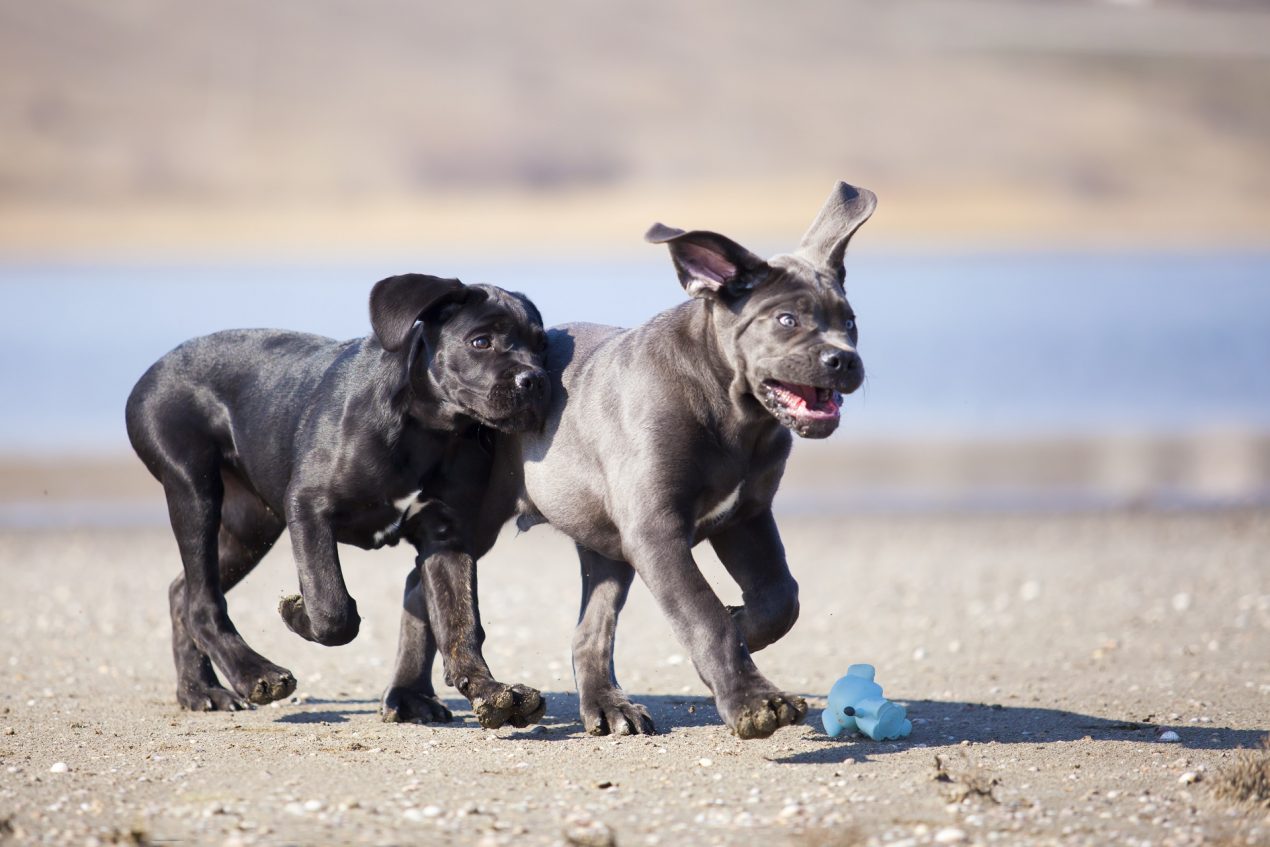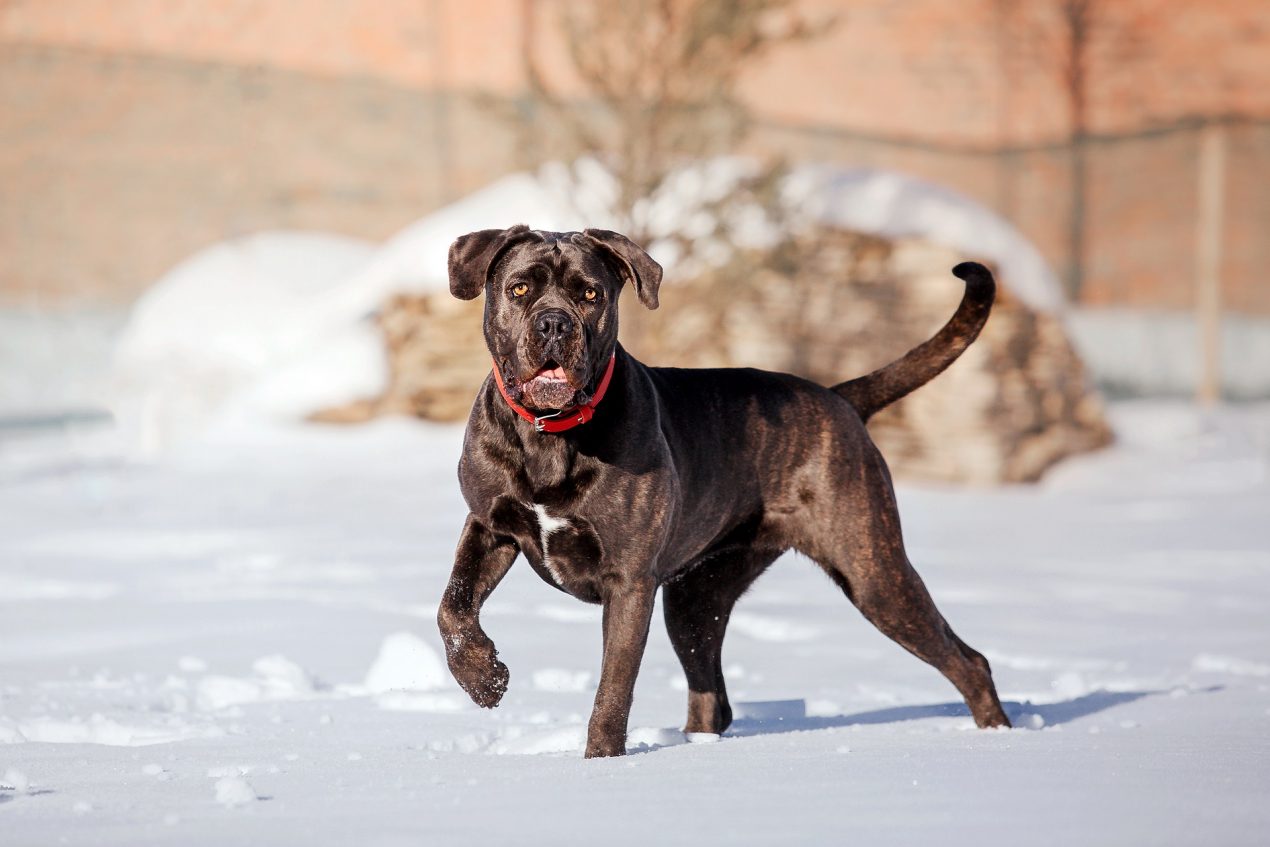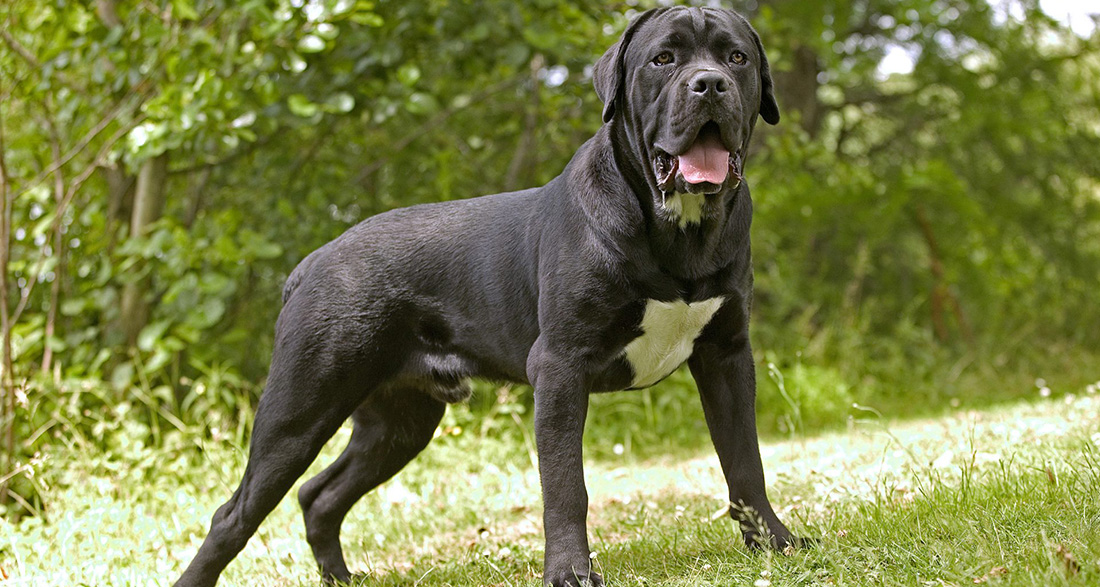The Cane Corso Italiano, commonly known as the Cane Corso and also referred to as the Italian Mastiff or Italian Corso, is often unfairly stigmatized as a fighting dog, much like many of its relatives. While its ancestors were indeed often misused as fighting dogs, the Cane Corso, with proper socialization and training, becomes a true family companion and even a friend to children.
History of the Cane Corso
The history of the Cane Corso can be traced back deep into antiquity, as far back as ancient times. There were pictorial representations of powerful dogs accompanying warriors as early as 2000 BC. These Molossers were not only companions in war but also played important roles in the armies of the Romans and their adversaries.
- Ancient Origins: The Cane Corso, a descendant of the Molossers, was originally bred as a working dog in Italy. In ancient Rome, it was used as a war dog, particularly as “piriferi,” dogs carrying burning oil containers that charged into enemy lines. This Italian breed has its roots in the Molossoide type group, known for its strength and protective ability.
- Versatile Roles in the Roman Empire: After the fall of Rome, the Cane Corso adapted to new roles. It became a guard dog, hunter, and indispensable helper on farms. Its tasks ranged from guarding houses and livestock to hunting wild boars.
- Evolution over Centuries: Over time, various breeds were developed from these large, powerful dogs, including Boxers, Mastiffs, Bulldogs, and Saint Bernards. The Cane Corso, along with the Neapolitan Mastiff, is considered the most original representative of the Molosser breeds.
- Survival in Italy: The Cane Corso lived for a long time in southern Italy, especially in Apulia (Puglia), and took on diverse tasks such as herding cattle and guarding homes and farms. Despite its importance, it fell into obscurity until it was rediscovered in the 1970s.
- Global Revival and Recognition: Thanks to the efforts of some Italian breeders, the Cane Corso experienced a renaissance. Selective breeding of the modern breed began in the 1980s, and in 1996, the Cane Corso was recognized by the Fédération Cynologique Internationale (FCI). Today, it is popular and well-known worldwide.
The origin of the name “Corso” is unclear, with some sources pointing to the Latin “cohors” (guard, bodyguard) or the Celtic “corso” (mighty). “Cane Italiano” simply means Italian dog.
Breed Overview
GROUP: Working
HEIGHT: About 23.5 to 27.5 inches at the shoulder, according to the American Kennel Club
WEIGHT: Typically 80 to 120 pounds
COAT: Short and coarse
COAT COLOR: Black, gray, fawn, and red; brindle is possible in all colors, may have black or gray mask, and may have small patches of white
LIFE SPAN: 10 to 12 years
TEMPERAMENT: Reserved, quiet, gentle, calm, stable, even-tempered
HYPOALLERGENIC: No
ORIGIN: Italy
Appearance of the Cane Corso
The Cane Corso is an impressive Italian breed known for its size and muscular build. Here are the detailed physical characteristics of this majestic breed, including the official standard sizes and weights provided by the Fédération Cynologique Internationale (FCI):
- Size and Weight: According to the FCI standard, male Cane Corsos reach a height at the withers of 64 to 68 cm, with a tolerance of ±2 cm. Female specimens are slightly smaller, ranging from 60 to 64 cm. Male dogs weigh between 45 and 50 kg, while female Cane Corsos weigh between 40 and 45 kg.
- Head and Facial Features: The head of the Cane Corso is large, massive, and characterized by a strong jaw. The eyes are medium-sized, oval, and dark, giving the dog a serious expression. The ears are often cropped but can also be uncropped.
- Coat Texture and Colors: The coat of the Cane Corso is short, shiny, and very dense with a slight undercoat. Colors range from black to various shades of gray such as lead gray and slate gray, to light gray, light brown, and dark brown. Brindle patterns are possible in all these colors. A black or gray mask on the muzzle that does not extend beyond the eye line, as well as small white spots on the chest, paw tips, and nose bridge, are acceptable.
These characteristics, combined with their imposing stature and muscular build, make the Cane Corso a unique and fascinating breed that excels both as a guard dog and a companion.
Character and Temperament
The Cane Corso is an impressive Italian breed that, despite its size and muscular build, exhibits a calm and balanced temperament. Here are some key aspects of its character and behavior in various environments and situations:
- Calm and Balanced Temperament: The Cane Corso maintains its composure in various situations. This calmness is particularly advantageous in hectic or busy environments, as it remains composed and is not easily overwhelmed.
- Loyalty and Protective Instinct: This breed is known for its loyalty, protective instinct, and intelligence. It is affectionate towards its family members but may be reserved towards strangers. The Cane Corso forms strong bonds with its family and is attentive and protective of its people.
- Adaptability to Different Environments: It’s important to expose the Cane Corso to different environments and situations to promote its adaptability and well-being. This can be achieved through visits to parks, cafes, and public events, exposing it to different stimuli and scenarios.
- Ideal Environment for Development: The Cane Corso thrives in an environment where it can utilize its strength, agility, and intelligence. Exposure to various environments, people, and situations helps it grow into a well-rounded and socially competent dog.
- Stability and Socialization: The Cane Corso is inherently stable and reliable. However, early and positive socialization is crucial to prevent possessiveness, territorial behavior, and dominance. Without proper socialization, the Cane Corso may be reserved towards strangers.
These characteristics of the Cane Corso demonstrate that it is a strongly characterized and confident dog that, in the right environment and with consistent training, can be a loyal and affectionate companion. Its history as a working dog is evident in its active behavior and intelligence.
| Affection Level | High |
| Friendliness | Medium |
| Kid-Friendly | Low |
| Pet-Friendly | Medium |
| Exercise Needs | High |
| Playfulness | Low |
| Energy Level | Medium |
| Trainability | High |
| Intelligence | Medium |
| Tendency to Bark | Medium |
| Amount of Shedding | Medium |
Acquiring a Cane Corso
The Cane Corso is listed as a potentially dangerous breed, known as fighting dogs, in some cities and towns around the country. Indeed, even the calm, balanced Cane Corso can become dangerous due to its size and strength if improperly trained. Before acquiring a Cane Corso, you should inquire about the housing regulations and requirements. In many communities, the dog tax for so-called fighting dogs is higher. Here too, you should inquire to avoid any unpleasant surprises.

What should I look out for when buying?
Large Cane Corsos tend to have hereditary diseases. If you want a Cane Corso, you should first look for a reputable breeder. The easiest way to do this is through a breeding association. You can recognize an honest breeder by the fact that they give you the opportunity to visit them and meet the parents and siblings of the puppy. They will be available to answer all your questions, not only about the purchase but also beyond. Don’t be surprised if the breeder also asks you questions about your life situation.
A responsible breeder wants his dogs to go to the best hands. A Cane Corso that has undergone all the necessary initial examinations and vaccinations and has been dewormed costs between $800and $1,100. Anything below that should make you suspicious, and you should not accept the offer. Because no breeder can afford to give away his dogs at a bargain price. These cheap prices come at the expense of the animals.
Development and Training of the Puppy
The development and training of a Cane Corso puppy are crucial to making it an ideal family companion. From a young age, you should set clear boundaries for your Cane Corso and show them that you’re in charge, but do so with authority and sensitivity. During this phase, the confident dog will test whether it can dominate you. It’s important to apply loving consistency in training to prevent it from becoming overzealous and defending its humans against others who are actually friends.
- Bonding Time: The first weeks are a sensitive learning phase. Building a strong bond is essential for establishing trust and laying the foundation for obedient behavior.
- Socialization: The Cane Corso should be socialized early with other people and animals. Positive experiences with various family members and pets promote friendly behavior.
- Crate Training: Providing a crate as its own “home” helps the dog understand its place in the family and offers a secure retreat.
- House Training: Designating a specific area for bathroom duties and consistent training are important for successful housebreaking.
- Impulse Control and Setting Boundaries: During growth, it’s important to train impulse control and set clear boundaries to reduce undesirable behaviors such as barking or jumping.
The Right Training for the Cane Corso:
Training a Cane Corso requires specific techniques and strategies to manage the breed’s strong protective instinct and strong-willed character.
- Obedience Training: Basic obedience commands like sit, stay, come, and down should be introduced from the beginning. Consistency and positive reinforcement are key to successful training.
- Positive Reinforcement: Use rewards like treats, praise, or toys to reinforce good behavior. It’s important to reward the dog immediately after successfully completing a task.
- Leash Training: Around 16 weeks, you should start leash training to ensure the dog doesn’t pull on the leash in adulthood.
- Further Socialization: Even after the puppy phase, the Cane Corso should regularly interact with other people and animals to maintain its friendliness.
- Dealing with Boundary Testing: Around 6 months, Cane Corsos begin to test their boundaries. It’s important to reinforce training and ensure enough daily exercise and mental stimulation.
- General Training Tips: Always be gentle and avoid getting angry or shouting. Keep training sessions short and consistent at the same time to give the dog a routine. Additional exercise can often help control excessive barking or bad behavior.
How to Keep a Cane Corso?
The Cane Corso is an impressive Italian breed that requires specific living conditions due to its size and muscular build. A house with a garden, preferably in the countryside, is ideal for this breed as it needs space to move and a task to protect.
Challenges and Responsibilities
Owning a Cane Corso comes with specific challenges and responsibilities:
- Temperament and Size: Cane Corsos are known for their strong and protective nature. They make excellent guard dogs and loyal companions for families. Their upbringing requires a firm and consistent hand to ensure balanced behavior.
- Family Suitability: Although generally good with children and other pets, it’s important to supervise interactions to prevent accidents. Early socialization is crucial to teach them how to behave around others.
- Exercise and Activity: This breed requires regular exercise to stay healthy and mentally stimulated. Daily walks, playtime, and mental stimulation are essential for their well-being.
- Health Care: Regular vet visits are essential to monitor their health and respond early to potential issues. A balanced diet and adequate exercise are also important.
Suitability as a Family Dog
The Cane Corso can be a good choice for families, but there are some important considerations:
- Size and Living Space: Their impressive size may be unsuitable for families with small children or limited living space.
- Loyalty and Protective Instinct: This breed is characterized by its loyalty and protective instinct. They are excellent protectors of their family.
- Adaptability: Despite their size, they can adapt to various living situations as long as they receive enough physical and mental stimulation. However, they suffer from separation anxiety if left alone for too long.
Legal and Ethical Considerations
When owning a Cane Corso, legal and ethical aspects must also be considered:
- Breed-Specific Legislation (BSL): Some cities and municipalities have specific regulations that regulate or prohibit the ownership or keeping of Cane Corsos.
- Public Perception: Due to their size and strength, they may be perceived as intimidating, leading to negative public impressions. Responsible dog ownership and education are important to combat such perceptions.
- Responsible Breeding and Ownership: Choose a reputable breeder who cares about the health and temperament of the dogs. Adequate socialization and training of the dog are crucial for living with humans and other animals.
Lifestyle Compatibility and Ownership Challenges
The suitability of a Cane Corso for various family configurations and lifestyles should also be considered:
- Exercise and Activity Requirements: Cane Corsos are an active breed and require regular exercise and mental stimulation. A balanced diet and regular vet visits are also important for their health.
- Responsible Ownership: As a Cane Corso owner, it’s important to be a responsible advocate for your dog and the breed. Ensure your dog is always under control to reduce negative public perceptions and minimize risks.

Health and Genetic Diseases of the Cane Corso
The Cane Corso, an impressive Italian breed, is generally robust and healthy.
However, there are specific health aspects to be aware of:
- Hip Dysplasia: A common orthopedic condition that can lead to pain, lameness, and restricted movement. Regular examinations and appropriate breeding practices are important to reduce its occurrence. Treatment options range from medication to surgical interventions.
- Dilated Cardiomyopathy (DCM): This heart condition results in an enlarged and weakened heart muscle, leading to symptoms such as exercise intolerance, coughing, and breathing difficulties. Regular veterinary check-ups, balanced nutrition, and adequate exercise are essential for heart health.
- Gastric Dilatation-Volvulus (GDV): This life-threatening condition, also known as bloat, affects deep-chested breeds like the Cane Corso. Symptoms include unproductive vomiting, a bloated abdomen, and restlessness. Immediate veterinary care is necessary, often requiring surgery.
- Hypothyroidism: This hormonal disorder occurs when the thyroid gland does not produce enough thyroid hormones. Symptoms include weight gain, lethargy, hair loss, and skin problems. Treatment usually involves lifelong hormone replacement therapy.
- Cancer: Certain types of cancer can occur in Cane Corsos. Regular check-ups, early detection, and prompt treatment are crucial. Treatment options may vary depending on the type and stage of cancer.
- Eye Problems: Cane Corsos are prone to various eye problems, including entropion, cherry eye, and progressive retinal atrophy (PRA). Regular eye examinations and prompt veterinary treatment are important for maintaining eye health.
- Elbow Dysplasia: Another joint disease that can cause pain, lameness, and restricted movement. Controlled exercise during growth and regular examinations help identify and treat these issues.
- Osteochondritis Dissecans (OCD): This joint disease mainly affects the shoulder and elbow joints. Early detection, controlled exercise, and appropriate nutrition during the growth phase are important for management.
- Arthritis: A degenerative joint disease that affects Cane Corsos in old age. Weight management, controlled exercise, and pain medication can help manage progression.
- Cruciate Ligament Tears: Common in active breeds like the Cane Corso. Symptoms include lameness and swelling. Surgical repair and rehabilitation are often necessary.
To avoid or manage these health problems, regular veterinary check-ups, a balanced diet, and tailored physical activity are crucial. Especially with puppies, it’s important not to overload them and to engage in activities like agility with caution to avoid joint issues.
Caring for a Cane Corso
Caring for a Cane Corso requires special attention to ensure their health and well-being.
Here are some important guidelines:
- Diet: Cane Corsos require a balanced diet rich in proteins, fats, carbohydrates, vitamins, and minerals. High-quality protein sources are important for muscle building, while fats support skin and coat health. Carbohydrates provide energy and contain fiber essential for healthy digestion. Monitor carbohydrate intake to maintain a healthy weight.
- Special Dietary Needs: Note that puppies require more calories and nutrients for growth and choose special large breed puppy food. For adult dogs, a diet with controlled calories and balanced nutrients to prevent obesity is important. For older Cane Corsos, diets with fewer calories but more fiber and essential nutrients like omega-3 fatty acids and antioxidants are beneficial.
- Grooming: Their short coat makes Cane Corsos relatively low maintenance. Regular brushing helps keep the coat healthy and shiny.
- Health Monitoring: It’s important to conduct regular veterinary check-ups to monitor common health problems like hip and elbow dysplasia. Heart health is also a significant concern, and a diet low in sodium and rich in heart-healthy nutrients like taurine and L-carnitine is recommended.
- Eye Care: Protect your dog from drafts and regularly check the eyes to detect problems early.
- Exercise: Ensure regular but not overly strenuous exercise to protect the joints and avoid overloading.
- Dietary Supplements: Supplements such as glucosamine for joint health, omega-3 fatty acids for skin and coat, and probiotics for digestion can be helpful but should always be discussed with a veterinarian.
- Allergy Management: Cane Corsos may be prone to food allergies. A hypoallergenic diet or the use of novel protein sources can help treat food allergies.
Interesting and Worth Knowing
Even in ancient times, the ancestors of the Cane Corso had prominent fans. For example, it is reported that Alexander the Great was a great lover of these dogs. In modern times, perhaps the most prominent owner of a Cane Corso is the actor Vin Diesel. Given the athletic and active nature of the breed, it’s not surprising that many athletes, especially American football players, appear on the list of famous owners. Boxer William Guthrie also counts himself among the owners of a Cane Corso.
Do you also have a Cane Corso or are you planning to get one soon? Tell me more in the comments!


